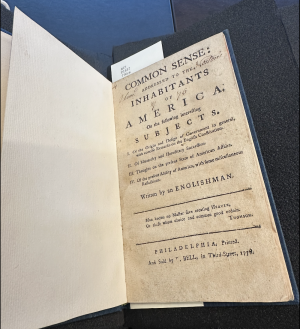"Common Sense", Early Edition - Thomas Paine
Backgroung
Introduction
"Common Sense" by Thomas Paine, published in January 1776, is arguably one of the most influential pamphlets in American history. Its vigorous argument for the American colonies' independence from Great Britain galvanized public opinion like no other work of the period. This entry explores a beautifully conserved example of a early copy of Thomas Paine's "Common Sense", the impact it had on the American Revolution, and its lasting legacy in shaping democratic ideals.

Historical Context
The publication of "Common Sense" came at a critical time. The American colonies were in the throes of a growing unrest against British colonial rule, fueled by incidents like the Boston Massacre and the imposition of the Intolerable Acts. Into this volatile atmosphere, Thomas Paine introduced "Common Sense," a powerful piece that crystallized the argument for independence. The pamphlet was not merely a reaction to specific events but a broad critique of the inherent flaws in monarchical government and British exploitation. Paine's writing captured the prevailing sentiments of fairness and common rights, pushing the public discourse towards decisive action against Britain.
Publication Details
"Common Sense" was published anonymously in Philadelphia, a strategic decision by Paine due to the seditious nature of the text. The pamphlet’s impact was immediate and profound, selling over 100,000 copies in just a few months, a staggering number for the period. Its affordability, at just two shillings, allowed it to spread widely and quickly among the colonies. The choice of Robert Bell as the publisher, a radical printer known for his willingness to take on controversial projects, was crucial in ensuring the pamphlet reached as many readers as possible. Bell's promotional strategies and the broad distribution of the pamphlet played a key role in its success and influence.